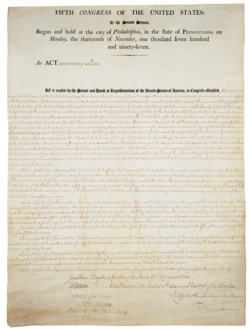
Back Lleis d'Estranxería y Sedición AST Alien and Sedition Acts Danish Alien and Sedition Acts German Leyes de Extranjería y Sedición Spanish Alien and Sedition Acts Finnish Alien and Sedition Acts French חוקי הזרים וההמרדה HE Alien and Sedition Acts Italian 外国人・治安諸法 Japanese Akta Hasutan dan Pendatang Asing (1798) (Amerika Syarikat) Malay
The Alien and Sedition Acts of 1798 were a set of four United States statutes that sought, on national security grounds, to restrict immigration and limit 1st Amendment protections for freedom of speech. They were endorsed by the Federalist Party of President John Adams as a response to a developing dispute with the French Republic and to related fears of domestic political subversion. The prosecution of journalists under the Sedition Act rallied public support for the opposition Democratic-Republicans, and contributed to their success in the elections of 1800. Under the new administration of Thomas Jefferson, only the Alien Enemies Act,[a] granting the president powers of detention and deportation of foreigners in wartime or in face of a threatened invasion, remained in force.
| Act | Purpose | Status |
|---|---|---|
| Naturalization Act of 1798 | To increase the requirements to seek citizenship. | Repealed in 1802. |
| Alien Friends Act of 1798 | To allow the president to imprison and deport non-citizens. | Expired in 1800. |
| Alien Enemies Act of 1798 | To give the president additional powers to detain non-citizens during times of war, invasion, or predatory incursion.[1] | This law, amended in 1918 to strike out the provision restricting the section to males,[2] is still in effect as 50 U.S.C. ch. 3. |
| Sedition Act of 1798 | To criminalize false and malicious statements about the federal government. | Expired in 1800. |

After 1800, and up until the second presidency of Donald Trump, the surviving Alien Enemies Act was invoked three times, in each case during the course of a declared war: the War of 1812, and the First and Second World Wars. The law was best known for the contributing role it played during the Second World War in the disproportionate internment of Japanese Americans.
In March 2025, Donald Trump cited the Alien Enemies Act as his authority for expediting the deportation of non-citizens engaged in what he characterised as an organised criminal-gang "invasion" of the United States. His removal under the Act of suspected Venezuelan gang members to El Salvador (where they are subject to indefinite detention) is being litigated in the courts.
Cite error: There are <ref group=lower-alpha> tags or {{efn}} templates on this page, but the references will not show without a {{reflist|group=lower-alpha}} template or {{notelist}} template (see the help page).
- ^ "50 USC Ch. 3: Alien Enemies". United States Code. Archived from the original on March 22, 2025. Retrieved March 25, 2025.
- ^ "Title 50 - War and National Defense Chapter 3 - Alien Enemies". GovInfo. Archived from the original on November 11, 2024. Retrieved March 25, 2025.
© MMXXIII Rich X Search. We shall prevail. All rights reserved. Rich X Search